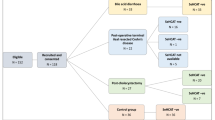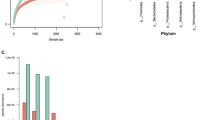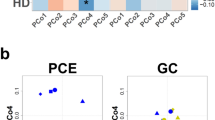Abstract
We have studied 30 patients presenting with breast cancer and 36 control patients admitted to hospital for minor surgery. Stool specimens were obtained for bile acid analysis and bacterial nuclear dehydrogenation activity (NDC) estimation. The mean total faecal bile acid (FBA) concentration (mumol/g) in patients with breast cancer was 15.6 /+- 1.8 s.e., significantly lower than for control patients (20.5 /+- 1.9). NDC were isolated from the faeces of 58% of breast cancer patients an 15% of control patients, this difference being statistically highly significant (P less than 0.005). Increased bile-acid degradation by bacteria in the large bowel may explain the reduced FBA concentration in patients with breast cancer. Increased NDC isolation in breast-cancer patients suggests that oestrogen production in the colon may play a role in the aetiogy of breast cancer in some patients.
This is a preview of subscription content, access via your institution
Access options
Subscribe to this journal
Receive 24 print issues and online access
$259.00 per year
only $10.79 per issue
Buy this article
- Purchase on Springer Link
- Instant access to full article PDF
Prices may be subject to local taxes which are calculated during checkout
Similar content being viewed by others
Rights and permissions
About this article
Cite this article
Murray, W., Blackwood, A., Calman, K. et al. Faecal bile acids and clostridia in patients with breast cancer. Br J Cancer 42, 856–860 (1980). https://doi.org/10.1038/bjc.1980.333
Issue Date:
DOI: https://doi.org/10.1038/bjc.1980.333
This article is cited by
-
The role of bile acids in carcinogenesis
Cellular and Molecular Life Sciences (2022)
-
The involvement of oncobiosis and bacterial metabolite signaling in metastasis formation in breast cancer
Cancer and Metastasis Reviews (2021)
-
Farnesoid X receptor alpha: a molecular link between bile acids and steroid signaling?
Cellular and Molecular Life Sciences (2013)
-
Intestinal Microbiota Was Assessed in Cirrhotic Patients with Hepatitis B Virus Infection
Microbial Ecology (2011)
-
Plasma deoxycholic acid concentration is elevated in postmenopausal women with newly diagnosed breast cancer
European Journal of Clinical Nutrition (2002)



